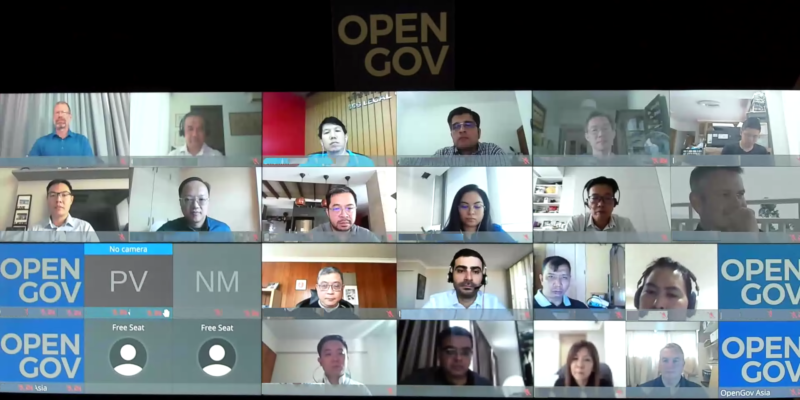
We are living in an era of smartphones and smart wearable devices. Gradually we are moving to online platforms for all our needs: banking, commerce and even entertainment.
While we do all this, we are producing huge amounts of data on a daily basis. With the pandemic thrown into the equation, the volume of data being tracked has definitely gone up.
So how do we manage and make sense of this data is the question governments and organisations are asking.
OpenGov Asia helped answer this question and more on 2 July 2020 at its OpenGovLive! Virtual Breakfast Insight: Using DataOps to deliver big value from big data.
The event saw an overwhelming turn out that included Chief Digital Officers and IT Heads from different organisations across various countries.

Mohit Sagar, Group Managing Director and Editor-in-Chief set the tone for the session.
Mohit began by sharing an interesting observation: while people were locked down at home during the pandemic, they were pushing out massive amounts of information.
This virtual flood of data flustered organisations and they were unable to stay afloat in the data deluge. Many lost an opportunity and were unable to gain intelligence and insights from it.
Numerous organisations are using ‘Tape Tech’ as a quick fix rather than digging deep and solving the problem for a long term.
Mohit advised the participants to work towards developing a thought-out data strategy.
He emphasised that data – the new oil for organisations – when filtered and organised well can enhance their financial capabilities.
He also conceded that there is a lot information available in this regard but encouraged organisation to seek advice from reputable experts in the field to formulate a suitable data strategy.

After Mohit’s presentation, Issam Hijazi, Director of Solutions Engineering for Hitachi Vantara (APAC), gave an overview on how foundational DataOps is and why is it so critical to organisations.
He began by defining DataOps in simple terms – as a process that improves cross- functional communication, integration and automation of data flow between various stakeholders from network edge to multi cloud platforms.
The objective of DataOps is to enable data democratization and a culture of seamless collaboration that leads to excellence.
He enumerated the three areas that DataOps handles: Agile data pipelines and analytics, data governance and operational agility.
He concluded by stating that, all-in-all, DataOps is about having a systematic end-to-end approach that helps manage data assets, data analytics and governance; a system that will help cut through various challenges to achieve creativity in organisations.
In closing he also shared a few Hitachi Vantara products that are aligned with DataOps principles and methodology that help customers manage their data effectively.

After Issam’s reflections on DataOps from a corporate standpoint, Prof. Guandong Xu, Professor of Data Science at the University of Technology, Sydney shared his insights from a more academic point of view.
He began by looking back at how the digital economy has developed and opining that data sits at the core of it.
He explained that the focus of data analytics has changed overtime from being more descriptive and diagnostic to more predictive and prescriptive.
Professor Xu shared some intriguing insights from a study recently conducted by University of Technology, Sydney during the COVID-19 pandemic.
The study aims to measure the positive impact of the safety measures put in place in different countries on their economies and employment rates.
Professor Xu talked in detail about the impact of economic support measures in specific countries and how it has affected the employment rate.
He emphasised that data analytics is a powerful tool that can help predict the impact of such crises and help governments better plan for the next one.
After learning about DataOps from different perspectives, the session shifted to the interactive polling phase.
On being asked whether their organisation currently uses DataOps methodology, delegates responded with a split between yes (35%) and that they are still working on it (30%).
A senior digital executive from Singapore shared that his organisation has a data centre in place currently where they can amalgamate and work on data.
Though they are on journey towards a DataOps methodology, they are facing some challenges in terms of acquiring data economically in the industry they operate in.
On being asked about the biggest challenges in formulating their data strategy, the participants audience offered very interesting responses.
The majority was divided between the second and the third option: Data democratization and self-service capabilities and Data integration, multiple sources and multi environments.
A Chief Data and Analytics Officer from an educational institution shared that she voted for the third option as there are many different systems in different environments in place; and there was no way to access the data in all these different places. This makes it very challenging to have a uniform data strategy for the whole organisation.
On the final question on how organisations are managing their data assets and if they are easily locatable or not, a majority of the participants chose: “We have some solutions, but they’re not fulfilling our needs. They’re either a bit manual, slow, not robust or automated”.
A Chief Digital Officer from Malaysia reflected that to some, data is easier to access as it is with their IT departments and they have the architecture around it. But there is still a lot of data that requires you to pick up the phone and to know its location. Overall, he felt, that from a digital transformation standpoint, their organisation still has a long way to go.

The session was concluded by closing remarks from Issam. He shared a very pertinent paradigm: DataOps is mainly about three things – people, processes and technology. Further, it’s not enough to just put them together to have an effective data strategy. One needs to have a futuristic approach towards these and invest in them overtime.
The delegates were well informed about the need and the processes involved in implementing DataOps methodology in their respective organisations.
















